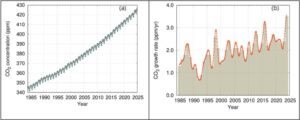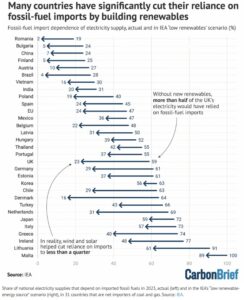Efficiency initiative rebranded, CO2 hits record high and forest flips roles
In this issue:
Efficiency initiative gets a rebrand
The Climate Group’s EP100, an inititave to improve energy efficiency among large corporates – the EP standing for energy productivity – has been rebranded as the Smart Energy Coalition. The group, which includes companies like ABB, Mitie, Siemens, AstraZeneca and Deloitte, has now outgrown its original name. The commitment for membership is a doubling of energy productivity by 2040, at the latest. Since inception nearly 10 years ago, the group has saved a combined 1,403 TWh of energy, 450 million tonnes of CO2e and US$1.7billion (NZ$3bn) on energy costs from efficiency measures.
CO2 reaches new record high
The World Meteorological Office has just released its latest update on CO2 levels and reports a record increase for 2024 as well as a new peak. On top of human activities, wildfires are cited as a major, contributing factor. Growth rates of CO2 have tripled since the 1960s and last year saw the largest increase since modern measurements started in 1957 at 3.5ppm (parts per million). Concentrations of methane and nitrous oxide have also risen to record levels.
Efficiency progress remains too slow
Hot on the heels of last week’s IEA report on renewables, IRENA has just published an equivalent which carries the same conclusions on renewables uptake, albeit with a few nuances. This analysis includes coverage of energy efficiency progress, which shows an improvement of just 1% in 2024. The IEA has indicated we need to be at 4% improvement a year to reach 2050 goals. The IRENA report calls for renewables targets to be included in NDCs supported by strengthened, government-backed investment targets for renewables.
Keeping the CCUS faith – a false god?
Continued faith in the promise of carbon capture, utilisation and storage technologies becoming viable and material is compromising emission reductions and, in many cases, being used as an excuse for inaction. That’s the conclusion of a new report from Climate Analytics. Many national frameworks and corporate strategies rely on effective CCUS emerging as soon as 2030, and yet it is not happening. In the meantime, the deployment of proven technologies such as electrification, energy efficiency, recycling opportunities and even hydrogen are being sidelined on the grounds CCUS will come good.
Circularity a real opportunity for decarbonising heavy industry
Meanwhile, significant emissions reduction from heavy industry could be made through adopting sound circularity practices, according to the European Commission’s Joint Research Centre. Its analysis indicates adopting integrated circular economy practices could save as much as 231 million tonnes of CO₂e per year across the region by 2050, that’s roughly the combined annual emissions of Spain and the Netherlands. Steel and plastics offer the biggest areas of savings but other heavy industries would enjoy significant savings as well.
Amazon wildfires worst in decades
Even though deforestation is slowing, wildfires in the Amazon last year caused 791 million tonnes of CO₂ to be released into the atmosphere, a figure 7 times higher than the average of the previous two years and the highest in over 20 years. The fires covered 3.3 million hectares, an area larger than Belgium and around 0.7% of the rainforest.
Deforestation slow-down missing targets
While deforestation may be slowing, the rate of slowing falls far short of targets and the rate needed to reach zero deforestation by 2030. 8.1 million hectares of forest were lost in 2024, a level of destruction 63% higher than the trajectory needed to hit zero by 2030. A further 8.8 million suffered degradation. The loss of humid, primary forest spiked because of forest fires.
Tropical forest switches role
An international team of researchers has concluded that Australia’s tropical rainforests have switched roles from being a carbon sink to become a carbon source. The conclusion follows the tracking of tree health in northern Queensland for nearly 50 years. It seems trees are now dying twice as fast as they used to, an outcome of more severe weather, specifically extreme temperatures, droughts and cyclones. The shorter lifespan means less CO2 absorption and greater emissions from rotting trees. The switch from sink to source is thought to have happened around 25 years ago.
First tipping point passed is …..
Coral reef bleaching. The marine heatwave over the last two years has seen 80% of the world’s coral reefs experience bleaching. This has been declared as the first of the 25 ecosystems monitored by Global Tipping Points to pass its tipping point threshold. Global Tipping Points is a collective of 160 authors from 87 institutions across 23 countries. One fears the reefs may not be the last system to pass its critical threshold.
Did you know …
Renewables have cut fossil fuel imports for 107 countries, who have saved a collective US$1.3trn (NZ$2.3trn) between 2010 and 2023? That’s just another interesting fact to emerge from the IEA’s Renewables 2025 report. Of course, the shift also improves fuel security and independence.


